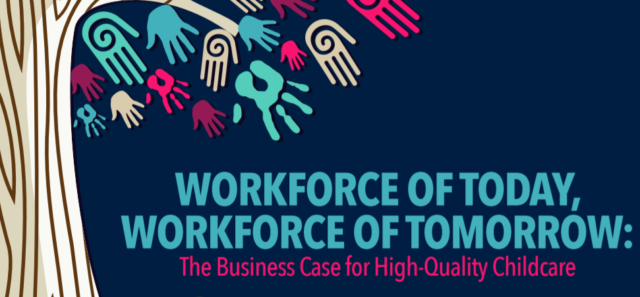Although registration for the Potts Family Foundation’s Oklahoma Early Childhood Coalition Business Summit is sold out, a couple of timely studies are in the news as the event approaches on Wednesday.
Brookings Institution influencing policies
On Thursday, KOSU’s Emily Wendler reported on City Councilman Ed Shadid’s initiative petition seeking a 0.25 percent city income tax to help fund teachers’ salaries. Although there are a lot of uncertainties associated with Shadid’s campaign, some sort of a tax increase would be a no-brainer if we were just discussing what is best for businesses (not to mention families).
Wendler cites Positioned for Growth: Advancing the Oklahoma City Innovation. (The report was previously described in Non Doc.) It recommended that the city:
Form a standing committee on diversity and inclusion … The committee would comprise and/or work more broadly with representatives from the district’s institutional and private-sector stakeholders; education providers such as Oklahoma City Public Schools, local community colleges, and technology (CareerTech) centers; area workforce entities; and the nonprofit community, including neighborhood groups. The committee would focus on issue areas like education, workforce development, entrepreneurship, and placemaking/neighborhood development.
In her article, Wendler also notes that Shadid frequently cites the Brookings Institution’s warning that Oklahoma City is running out of time for addressing its education problems. Brookings researcher Scott Andes was quoted as saying that the city has a lot of strengths in terms of competing in the global marketplace, but it needs “a clear pipeline through your education system.”
Andes also praised the OKC innovation district, but he “questions whether the state itself is spending enough money to get Oklahoma school children where they need to be to thrive in the 21st-century economy.” Andes advised, “When companies and others start making their bets around the world, are they going to look at Oklahoma City? If you don’t have the workforce it won’t happen.”
The business case for early education
Katharine Stevens of the conservative American Enterprise Institute issued another major report last week. Echoing Brookings, the AEI’s report concludes:
American business depends on a strong workforce, now and in the future, to compete and succeed globally. But America is facing an unprecedented workforce crisis: a large and growing shortage of skilled workers.
In an interesting twist to the business argument for investing in high-quality early education, Stevens writes, “Done right, childcare provides a powerful two-generation approach to building the skilled workforce on which our country’s continued prosperity depends.” It has long been known that a dollar invested in high-quality early education is likely to yield up to $9 in benefits. But, the business sector’s case for early education also emphasizes the immediate benefits to the economy.
As AEI states it in its report, the business case for early education starts with the fact that “fewer than half of low-income 5-year-olds enter school ready to learn, and some are up to two years behind their peers.” Moreover, “recent research shows that schools’ primary challenge is to compensate for early disadvantage that handicaps many children even before they enter kindergarten.” So, if we are going to compete successfully in the global marketplace, we must face a common sense reality: “Instead of trying to close achievement gaps after children have entered school, it’s far more efficient to prevent those gaps from emerging in the first place.”
“By 2020,” Brookings adds, “65% of all American jobs will require some form of postsecondary education or training.” The “root cause” of our k-12 schools’ failure to produce enough educated workers is “that we’ve neglected the critical first link in the human development chain.”
And that leads to the AEI’s second argument, and how it is not just the younger generation that would see gains if we invest in high-quality early learning. Brookings reports that “among nonworking poor with young children (11.4% of nonworking poor), a full 70% cite ‘taking care of home/family’ as the reason they’re not in the workforce.” It then cited a series of state studies about the ways that early education would benefit today’s workers and businesses. In Louisiana, for instance, the researchers “estimated that the costs of inadequate childcare totaled $2 billion in 2016.”
High-quality early education ‘unaffordable,’ ‘unavailable’
The Potts Family Foundation’s conference on the business sector and early education investments is a part of the 25 by 25 campaign, which seeks to put Oklahoma in the top 25 states in the nation for child development by 2025. As a prelude to the conference, the AEI offers some hard economic facts. First,
Pay in the childcare field is lower than in 97% of all U.S. occupations. … The average wage for full-time, professional childcare workers in the United States was $10.72 per hour in 2015—a little less than wages for parking lot attendants.
And government doesn’t have a better record: “less than 2% of state care and education expenditures are spent on early childhood.”
Across the nation, two early education realities are clear: “High-quality care is unaffordable,” and “High-quality care is unavailable.” (The emphasis is in the AEI report.)
A local fact is equally obvious: A first step toward our city’s successful competition in the global economy must include the insights – and the calls for teamwork – that will be discussed at the Oklahoma Early Childhood Coalition Business Summit. To compete in the 21st century, Oklahoma City must be inclusive and create collaborative partnerships in early education, public schools, local community colleges, CareerTech centers, higher education and the nonprofit community.
(Clarification: This post was updated at 11:15 a.m. Thursday, July 13, to provide a more accurate dollar figure for early-education benefits.)






















